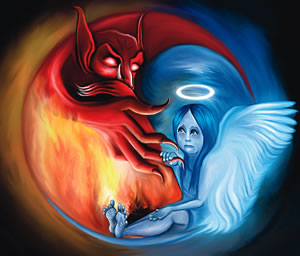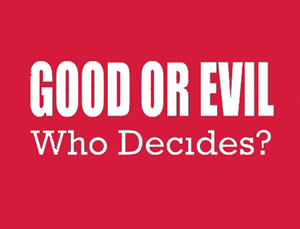God, Good and Evil

by Bill Farrelly
I HAVE felt tormented lately, trying to understand why God has allowed mankind the power to commit acts of gross atrocity. A few moments ago the conundrum was resolved when I suddenly realised that man’s capacity for evil is inversely proportional to his capacity for good. 
Having that new understanding is both terrifying and beautiful; we have been given such awesome power. The problem, as I see it, is that it is more terrifying than beautiful. What do you think?
I believe science has established that even the most focused, the most disciplined, the most brilliant of human beings use only a fraction of their God-given potential. Not all science would credit God, of course.
Perhaps naively, I have always considered this potential in a positive way, amazed that mankind – you and I – have such vast untapped creative ability.
At various times in my life I have felt guilty for wasting, or at least not exploring, some God-given talents. But I have never been tempted to explore my capacity to do ill.
That is not to say I have not done ill. I have hurt others – sometimes deeply; I have done things I knew to be wrong. On these occasions I have made the choice to do, if not evil, then the morally incorrect. Writing it down like this makes me feel decidedly uncomfortable but it is a fact.
Obviously I am not in the same league as Hitler, Pol Pot, Stalin or any other of history’s monsters but the fundamentals remain the same: they/I have a choice and frequently we opt to do what is wrong – sometimes grossly so. The challenge is to understand that God is in every one of us. There is no such thing as an inherently evil person. We become evil because of the choices we make.
Even then, God remains available to us. It is a frightening and beautiful thought, isn’t it, that God could remain available to someone who has done/is doing indescribable evil?
Similarly, we become good because of the choices we make: Father Damien, Mother Teresa, Mary MacKillop, Father Chris Riley are obvious examples.
It is usually vastly more difficult to choose the narrow path, the good path. Almost invariably it entails sacrifice. But not always. It is my own experience in recent years that the less I think of myself and the more I think of others, the happier I am. Where is the sacrifice there?
But why has God given us such immense power? Why didn’t he limit our potential for evil? Why is free will so free? The answer, it seems, is that God is allowing us, if we choose, to become God-like. And that, for me, presents another challenge.
I am not sure I want to be like God. I am comfortable in my humanity. I am comfortable knowing I sometimes err. I don’t want to be too good. I especially don’t want to be considered too good.
And so the obvious question arises once again: is this yet another example of my hypocrisy?
It was, in fact, concern over my hypocrisy that prompted me to undertake this particular musing.
I am often very vocal about the treatment of criminals, including those in the worst categories. I am a great advocate of mercy and rehabilitation. I get angry as political parties seek to outdo one another with their take-no-prisoners law and order policies
But, and it’s a very big but, I have not been a victim. One of my children has been and I felt great anger and I wanted to see the perpetrator punished but my son’s injuries were not severe.
How merciful would I feel if I or a member of my family were victims of horrific crime? Would I still speak out against the system that wants to lock up the perpetrators and throw away the key?
There is my dilemma. If I truly aspired to be good, to be God-like, I would reach out, as others have done, and forgive my tormentor.
But could I do it?
 Entries(RSS)
Entries(RSS)